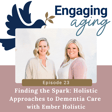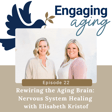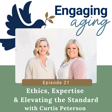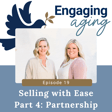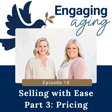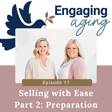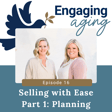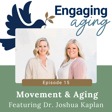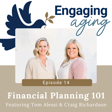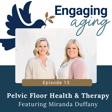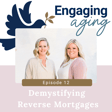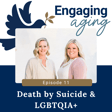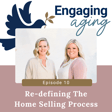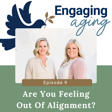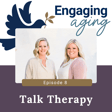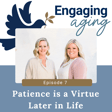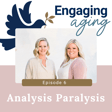Become a Creator today!Start creating today - Share your story with the world!
Start for free
00:00:00
00:00:01

Finding What’s Next with Kimberly Napier
Feeling stuck, uncertain, or disconnected from your purpose? In this inspiring conversation, coach and author Kimberly Napier joins Engaging Aging to share how older adults and caregivers can reconnect with themselves, gain clarity, and dare to choose what they truly want next. Through personal stories and practical mindset tools, Kimberly reminds us: you have all the answers—you just need space to listen.
Connect with Kimberly:
Download her free book and explore coaching programs at www.kimberlynapier.com
Follow her on Instagram @kimberly_napier
Transcript
Introduction to Engaging Aging
00:00:00
Speaker
Welcome to Engaging Aging. I'm Erin DeCarlo. And I'm Lauren Watts. We believe life gets richer with age, and we're here to prove it. We bring you real conversations about aging well, living fully, and navigating this journey with confidence.
00:00:15
Speaker
So let's dive in, because aging isn't something to endure, it's something to embrace.
Guest Introduction: Kimberly Napier
00:00:22
Speaker
Welcome back to Engaging Aging. We are so excited for today's special guest. We're joined by Kimberly Napier. She is not only incredible coach, author, but she's also our own first business coach who has helped us really step into our power and thrive with our business here at Dovetail.
00:00:43
Speaker
Kimberly is the creator of Dare Change Method and the bestselling author of Know What You Want Next, Break Free of the I Don't Know Trap, and also Elevated, Take Your Life to the Next Level.
00:00:56
Speaker
She's here today to share her insights on how older adults, especially those of you who may be feeling stuck or uncertain, how you can make some empowering shifts in your life to discover what you truly want next, especially So we are so excited for this conversation. Thank you for joining us. This has been a long time coming. Yeah, so exciting. I'm so excited to be here. So I was thinking this, yeah, of course, this morning, i think the first ever podcast I listened to was you and Catherine's podcast. I remember being like, a podcast.
00:01:30
Speaker
What is this thing? And that was probably, i don't know, six or seven years ago. What is the name of your podcast? Manifesting Mastery. There it is. i remember it. I'll have to check it back out.
00:01:40
Speaker
Absolutely. So without further ado, we obviously know you personally, but professionally, you've shared your story with the world through your amazing books and your coaching and your different speaking engagements.
00:01:54
Speaker
We'd love for the listeners to know a little bit about your background and what brought you to this world of coaching and being an author.
Kimberly's Transition from Corporate to Coaching
00:02:01
Speaker
Yeah, absolutely. Thank you. So I always laugh because, you know, ah people don't just wake up one day and become a coach. it Something happens in life. And for me, it happened about almost 13 years ago.
00:02:14
Speaker
i was living a very different life and i was in the corporate world. I thought that I would stay there and retire and that would be my path. And I was thrown a curveball with the sudden death of my husband to suicide when my girls were just 8 and 10 and my whole world was turned upside down. So it was really a moment where I thought I don't know how I'm going to go forward. And I did because, you know, that's just kind of what we do is we have to he just move through it.
00:02:47
Speaker
And it left me in a place, though, where I really was feeling broken and unfulfilled at work. And I went through this journey of everything just seemed to be falling apart, you know.
00:03:04
Speaker
um And and but in a matter of months, I lost my husband, my dad, and my younger or my older daughter went into anaphylactic shock on Christmas Day. Mm-hmm. And I just got to the place where i had to surrender to God and say, I can't do this anymore. Please save my daughter and I'll do anything. Just give me a sign.
00:03:25
Speaker
And that night, saying thank God, she was okay. And I went home that night and I just decided that I'm going to live with gratitude going forward because I had lost so much, but I still had so much.
00:03:38
Speaker
But I still went back to work. because even though it wasn't fulfilling for me anymore, I felt like I had to, like it was what I needed to do. and when I was in the boardroom couple months later, I got a sign from God, i believe, and i literally heard a voice inside that told me to leave.
00:03:59
Speaker
It was like a get out, which sounds crazy, and it did seem crazy at the time. But I couldn't unhear it. And I heard it twice, in fact. And i got up and i left my corporate job that day without a plan.
00:04:13
Speaker
And I think it's important for people to know you didn't just have an average corporate job. You were extremely successful, upper management, running teams, international organization, like very high power position. This wasn't something like this. This message was so clear that this was a big deal, but you knew you had to do it. Absolutely. I had been in this career for 22 years. I was head of global insights for a major business.
00:04:43
Speaker
iconic brand And i just got up that that day and I left and I went and told my boss. He's like, are you okay? And I said no. And I had this voice inside that said, no, I need to leave. I need to be home with my girls and I know I'm meant to help other women.
00:05:00
Speaker
Who have gone through what I've been through. And I left that day without a plan. But it was like I had this knowing inside that I was meant to do something different. And I trusted it. I'd never felt that in my life before.
Finding Joy and Positive Psychology
00:05:14
Speaker
Was that scary for you? You know, it's so funny because it should have been, but it wasn't. It was like i when it happened, I wasn't scared. But then i did have this moment where I was like, wait a minute, what am I doing?
00:05:26
Speaker
and like looking back, it was divine intervention and just gratitude for that moment too. Absolutely. That connection. And then it was as if the universe just dropped these breadcrumbs and it led me to positive psychology.
00:05:40
Speaker
I won't get into that whole story because that's a longer story. But I found it about a month later and I knew that was what I was meant to do. And I was meant to go there to help me and my girls heal. And we did. You know, we had been doing traditional methods of therapy and therapy.
00:05:55
Speaker
It was helping a bit. But what i realized was I was ready to give myself permission to live again. and I felt like that was my purpose after my husband had taken his life. I had to show my kids how to live and choose life. That's and beautiful. And so I threw myself into that. That's beautiful that I had to show my girls how to live. Yeah.
00:06:16
Speaker
And I think so many of us don't know how to give ourselves permission. We get stuck in whatever that emotion is, whether it's grief or overwhelm or whatever, and people don't know how to take one tiny step forward to get through that. And positive psychology gave you the tools, it sounds like, to start to reshape some of the mindset and find the motivation to do the hard thing.
00:06:39
Speaker
to ultimately live your life. Absolutely. And, you know, it was also just permission to feel joy again. Because after loss, I think it's hard for us sometimes to allow that. And there's so much that other people are projecting onto you about how you should be grieving and how you should be feeling.
00:06:58
Speaker
And there was a moment where my children said to me, it was basically after my my dad died, a month after my husband died, they said, Mom, why is all this bad stuff happening to us? or Are we bad? And in that moment, I knew that I had to show them that they were worthy of joy and love and and peace and living again. and so it kind of got my, ah if I can swear a little bit, and I was like,
00:07:26
Speaker
I'm not feeling joyful, but I have to be joyful. Like I have to choose it to show them and model for them that that's okay. Yeah. And I think that's one of the beautiful philosophies. And maybe we'll dive into a little bit more today, like feel it before it exists.
00:07:41
Speaker
It's like fake it till you make it a little bit. Yes. It might even feel inauthentic. Face it till you make it. Face it till you
Applying Gratitude and Positive Psychology
00:07:47
Speaker
make it. That's good. You can't go over it. You can't go under it. You got to go through it. Absolutely. You do. So tell us about, so you have this, this experience, you start um using these modalities and this education and training and positive psychology with yourself and your girls. At what point did you say, this can be ah profession, like the coaching could be my thing?
00:08:06
Speaker
Right away, actually. And I will actually say, i I said that even before I went to the class because I've always been, ah ah i guess, a provider in a way. Like i knew i I knew I wasn't going to stay home forever. Like I had to find something. And before I even went into positive psychology, I had gone on this little um journey to find myself again. And I kept hearing, you should be a coach. You should be a coach. And this was almost, you know, 14 years ago, 13, – that um Coaches weren't really a thing in Massachusetts. Yeah, it was new. so West Coast. That was a West Coast thing. So that's what saying.
00:08:42
Speaker
So that's a California thing. yeah They're not going to buy that in Massachusetts. um So it was sort of in the back of my mind. And then when I got to... the class, which I was in a year-long certification, I just knew this was what I was meant to do.
00:08:56
Speaker
yeah It just really clicked. So really right away. And to any listeners that or have been to our educational events and you've heard Lauren and I talk about positive psychology, that all came from after being coached by Kimberly and she – brought together that this is an actual you know neuroscience and methodology that works. And so we've been using positive psychology approaches with our older adult clients for at least six years since we met you, and it's been ah life changer. so if if any of that is of pin interest to you, we'll make sure we connect with those And it's interesting too, it truly is a daily practice.
00:09:31
Speaker
You can't just pick up a book and think, oh, I'm magically cured. I'm living in a state of gratitude every single day of my life. It is a constant check in with yourself yes to say, how can I change this thought process for myself? Right?
00:09:50
Speaker
Yes. And gratitude is in so many ways, it's a tool to make you feel better. But for me, I feel like it really saved me because it enabled me to really shift my reality and look at what I did have. And I think that's the key thing is that we get so stuck in what we don't have. And The difference between psychology and positive psychology, you know, it's really the same thing. But we've made psychology pathology. What's wrong with you?
00:10:17
Speaker
Whereas positive psychology looks at what is right with you. Yes, and build upon that. And that's how we thrive and flourish is when we're able to build upon our strengths and look at – What is working in our world? What is something that I can build upon? Right.
00:10:31
Speaker
And what do I appreciate? That's when you get more to appreciate. And that's when you really start to attract things. when We talk about manifesting. It's that's when you were always manifesting all the time. Right. But what are we manifesting from?
00:10:42
Speaker
If you're able to get into that deep state of appreciation, then you're actually going to attract more of what you do want. Yes. And it really is that simple. Yeah. And i I want to be clear. This isn't like Pollyanna. We're asking everybody to like fake that they're happy out there.
00:10:56
Speaker
This is showing reverence. Yes, we understand what's not working, but then shifting your attention to what is and how to have more of that. For many of our older adult clients, sometimes it actually, the first time I met you was at a women's business conference or something.
00:11:12
Speaker
And you asked everyone in the group, What is something that brings you joy? And it can't be your spouse or your kids or your work. Like what's your, what's the personal thing that brings you joy? And I will never forget sitting in Waltham in that boardroom and really welling up with tears because I couldn't answer the question.
00:11:31
Speaker
I really couldn't answer the question. And now that we ask our clients these questions, like, what's the thing? I know that there's a lot going on. You've lost a spouse or you're dealing with a recent diagnosis. What is something that brings you joy? And oftentimes they also can't answer that question.
Beyond Societal Roles: Identity and Joy
00:11:46
Speaker
And so I had to, because you prompted us, if you can't think of something, think about earlier in your life. What was something, an activity or a hobby or something that brought you joy earlier in your life?
00:11:57
Speaker
And I immediately knew my answer was time in the barn with horses. Wow. which was my childhood growing up. But I hadn't connected in that way with horses in 20 plus years until you asked that question.
00:12:09
Speaker
And so I want to talk a little bit about that. Like how, how do you start when you're working with your clients or people who are just feeling stuck?
00:12:20
Speaker
Tell us a little bit about some of your approaches and your philosophies to this work. Yeah. Well, I just want to also add to that that it's so common, what you just stated, that we don't know what brings us joy. We can lose connection with that over time, especially as women, because we take care of so many other people, whether it's children or employees.
00:12:42
Speaker
We can get lost in that and we get on autopilot and we disconnect from so from ourselves and also from like what gives us joy and even wanting. you know? And so a lot of times when people come to me, they don't know what they want next. They just know what they don't want and they feel lost.
00:13:00
Speaker
You know, um they feel like they just, you know, they used to know what they wanted, but now they don't know. And it's because they are disconnected from themselves. So, so much of our work is really about reconnecting with them and where they are now and allowing that to start to be enough, you know, that it's,
00:13:19
Speaker
you know, who am I now? And once you're able to answer that, then the clarity comes. But so often we're always trying to figure it out. Like, well, what do I want? What do I want to do next? And we're not able to really see the big picture because we're so lost from ourselves. We're almost like living outside of ourselves. Well, identify as that role. So it's like, who am I? I'm a mother. No, that's not who I am at my core, soul being.
00:13:40
Speaker
Who am I? I'm a wife. Still not there yet. Who am i I'm a business partner with Lauren. Nope, nope, nope. It's like we don't we are so identified with the roles in which we play in our life yeah that to come back to self is the answer. yeah I know from personal experience working with you, that is challenging to come out of the chaos of every role that you are, what you're living, the environment around you.
00:14:06
Speaker
the noise that's around you from other people, it took me a really long time to actually go very deep inside to know who is that little girl inside of me, who is Lauren, and what does bring her joy, what does she still need as a 40-plus-year-old woman, um and really honor that and really be close to that. like It brought up so many emotions. I remember being in Sedona with you The tears were flowing moment after moment because it was like for the first time, it's really hard. And I say it to Erin all the time, it's so easy for someone to say, journal what you're feeling right now. Journal what you desire to have.
00:14:50
Speaker
Until you can sit in that silence and remove that chaos, I couldn't come out of it. I could not give you a very quick answer. Whereas I think other times people can. yeah I'd love to know if you could give a little tip. If there's a listener later in life listening to this and that question, they feel a little stumped, what are some self prompts that they could really start to go inward a little bit and reconnect with that self?
00:15:17
Speaker
Well, I think both of you brought up some
Reconnecting with True Self through Stillness
00:15:19
Speaker
really good points. One is getting still and like letting yourself have that space. I think we're so and uncomfortable in that space, but that's really where you have to go in that discomfort and be with yourself.
00:15:30
Speaker
And we're always, you know, busy and doing other things or filling our time and we avoid it But letting yourself sit with yourself and reconnecting with that little girl, you know, whatever. It could be your 20-year-old self. It could be your 30-year-old self. It could be your 5-year-old self.
00:15:46
Speaker
And letting her be heard and seen and witnessing her. And that's sometimes hard to do. But often in those moments, we get the insights that we need. It's just getting in that stillness. And, you know, if you can't bring up your younger self, you know, call in other reinforcements, you know, whether you believe in God or source or whatever.
00:16:06
Speaker
Or the universe, you know, allow in your your guides to help you with that. But it is starting with, you know, allowing yourself that space to just connect and go inward. That's beautiful.
00:16:18
Speaker
I also want to offer our audience too, I think sometimes it's okay just to know that maybe you can't do it on your own. Like I could not do it on my own. i needed someone else to help me through that because i was always second guessing, calling in those guides. what am I hearing? What am I seeing?
00:16:35
Speaker
is this accurate? Is this my mind taking over versus what it truly what I truly want? um So it wasn't until really started working with you and your network of really opening up and going deep inside.
00:16:49
Speaker
Like I could never get quiet. Someone would say to me, oh, meditate? What's meditation? yeah i go It's like folding my legs and crossing my arms and opening my palms. Like yeah I couldn't do that. I couldn't be in that stillness and that silence.
00:17:04
Speaker
And it's not like I come from a lot of trauma, but there were things that I just couldn't go there. I think one thing we hear a lot too is people are afraid to go there. They're like, oh no, there's too much pain or grief or skeletons in my own closet.
00:17:18
Speaker
that I just have to remain buttoned up to not allow the things to come. And what I say is it's already those things are already there causing you behind-the-scenes pain. It can only get better when open and lifted. Yeah.
00:17:31
Speaker
And so much of it is just shutting off your brain and getting into your heart, right? Because our mind can be very deceptive and it's always looking for like what is wrong because it's wired for negativity bias. Survival, yeah. So we're always looking for that. So if you can even just drop into your heart center and Just sit in that. And from that place, you will get a different guidance. Like that's where you can really receive information. I think about meditation more about receiving than clearing. So clearing can be hard, especially if you're a type A and you like to get things done. And, you know, it's hard to shut your brain off. But if you can just imagine that when you go in, you're actually going to get the clarity you need. You ask a question and it's going to come to you. It's just in that stillness, it'll catch up with you.
00:18:15
Speaker
So but I don't usually start people off with meditation back to positive psychology. i ah usually start people off with working with their mindset because it feels more tangible and um it's a baby step, you know, and.
Creating Positivity and Neural Pathways
00:18:32
Speaker
So starting to shift your perspective to just even saying, okay, I know that things aren't perfect in my world and there's a lot that's not going right, but I'm going to invest in looking at what is going well. Like what is one thing that's going well right now? And and allowing yourself to have that even in spite of everything else.
00:18:50
Speaker
um because the more you do that, you're creating that neural pathway to look for the good, and then you will start to see more of it. We've all had that experience. um I think we were talking about before about peacocks, you know, staring at peacocks and thinking about peacocks, and then all of a sudden there's one on the road in front of Lauren. It's like,
00:19:08
Speaker
Wow. Well, you know, your brain is looking for the evidence of whatever we're feeding it. So if we're feeding it all the time, things that aren't working or what's not going well, that's what we're going to see. But if we start to look at, well, let's balance it out and say, well, what is going well? What is the best case scenario here? You'll start to see that more.
00:19:27
Speaker
So that's usually where I start people. And a great way to do that is through gratitude. You know, what what are you grateful for? What are the blessings in your life? Because you can always find things that are not there.
00:19:40
Speaker
So when I started working with you, my third daughter, Lucia, this child, everyone, to all my listeners who had children that didn't sleep, she never slept. We were in Boston Children's Hospital, the Ferber Clinic, for like a year. i was so sleep toed deprived. I started Dovetail during that time.
00:19:58
Speaker
Started this company with sleep deprived infant. And I was so exhausted and overwhelmed. And all I could think about was the fact that my child never slept.
00:20:10
Speaker
And you said, what I'd like you to start doing every night before you go to bed, write down three things about her. Three positive things from the day. Three things about Lucia that you were grateful for, that I love, that went well.
Gratitude in Family Dynamics
00:20:22
Speaker
Because i was there was an animosity building within me for my own child because I just couldn't figure it out. And I like to be successful at figuring things out. And within like a week, it was like, okay, to your point, when you start to pay attention and have gratitude for what is working and where the blessings are, it didn't take away. By the way, she didn't just start miraculously sleeping through the night. It didn't cure that.
00:20:48
Speaker
That came over time. But... the energy went in a different direction. and ultimately, yes, she did start sleeping through the night, probably also because I wasn't focused on her not sleeping. ah changed the way you were with her. Yes, which now we know about the nervous system. Like we are literally sharing our energy and our nervous system with our children. So there's some practical. And I think Lauren and I do this with our clients, you know, so often when we're coming into a client situation,
00:21:14
Speaker
Maybe they've been to the doctor or a visiting nurse has come or their children are reminding them and focusing what's not wrong, what's unsafe in their home, what are they not successful at doing.
00:21:26
Speaker
And many times we're the first person in their life to say, we we don't actually don't care about that. We'll get to that. What works well for you here? What do you love about being in your home? What would you like to do more of?
00:21:39
Speaker
And the you can see the shift in our clients immediately. yeah absolutely But you can also see the shift in their primary caregivers or their family members when you do focus on the positive versus focusing on what's not working well.
00:21:54
Speaker
In terms of how do we now make a plan to move forward, right? I'm sure with your daughters, when you decided, I'm going to take a positive psychology approach and they said to you, why do all these bad things happen to us?
00:22:07
Speaker
How quickly did you see a change in them when you were practicing gratitude on a daily basis that they didn't feel that way anymore? Oh, instantly. Yeah. Yes. It's amazing.
00:22:17
Speaker
It's powerful. Yeah. So tell us about, um so we have really two types of clients and probably two types of listeners here. We have um adult children who sometimes contact us.
00:22:29
Speaker
They're feeling overwhelmed. They're in like this caregiver squeeze burnout. There's a lot of guilt and shame over back to your point. I should feel a certain way or I should do this for mom and dad or whatever it is.
00:22:41
Speaker
And then we have the older adult themselves where we really try to help clear out all that noise from the influencers. But the feeling of being stuck is the reason probably we get the phone call.
Overcoming Fear and Embracing Change
00:22:55
Speaker
So expand upon a little bit about maybe why humans get stuck or like this is not just for younger generations. It's just a human experience. What is it about us as humans that we just get stuck?
00:23:11
Speaker
Well, it's interesting. you know i don't think that we really are stuck. I think that is the story that we tell ourselves. And usually it's because we don't know what to do. So it's not that we don't know what we want to do or what ah would work even, but we're often afraid of making the step because we don't know if it's the right one or we're going to fail or we're going to look bad or something We don't know what the next thing is. So I work with a lot of women and often they're overthinkers, you know, and high achievers are usually overthinkers. So um there's this, well, if I do that, then what about this? And then what if this happens? And we kind of go down that road, like we have to have everything figured out. Just to take the step.
00:23:54
Speaker
just to take the first step. And so the easiest thing is to just take that first step. But usually we don't have the courage to do that because we have become disconnected from ourselves. So to me, it all goes back to a sense of self and really understanding who you are now and who you want to be. And once you start to figure that out, the rest of it starts to figure itself out.
00:24:17
Speaker
What happens when people, I'm asking an obvious question, but when we start to do the work, when we gain clarity, when we start to focus on self and find out what we need and start to take aligned action, what can sometimes happen to those around us?
00:24:36
Speaker
I feel like you know, yes, you know the answer to this one, right? I mean, we see it with the adult daughters. They're like, whoa, whoa, whoa, what's going on with mom? she has She's acting different. And ah so I always tell people when, because sometimes I have, um you know, someone come to me for coaching that has been prompted by a loved one. And i will often say to them, well, just know that things are going to be different going forward. And then they're like, what happened? You know, I often coach younger people who their parents are like, well, wait a minute, why don't they want to go to college? Like, that's not what they want.
00:25:11
Speaker
So you start they start thinking yeah on their own and people don't always like that because the patterns are breaking that they have... had with their loved ones. Which, what do they say? We'll always choose the um familiar hell over the unfamiliar like joy because we all were just it keeps us safe, right? Absolutely. like A baby will stay with ah an abusive mother because it's what they know and that's their comfort.
00:25:35
Speaker
And so we stay in our comfort zones as well. And we have to and that's all what this is, is like learning how to break free of those survival patterns. But it's so freeing. I mean, we've seen people in their 80s or ninety s do the work and literally thrive later in life. Like it's not, late it's not over until it's over yet. And why not to our listeners? Like, what do you have to lose? You, you've, you've done the other way your whole life. How is it serving you? If it's not great, let's, let's live our best life, you know?
00:26:04
Speaker
Yeah. And, you know, i would say, too, if they start changing, they might inspire their loved ones, you know, inspire their children to make changes. And i usually tell my clients, too, if you want to make a change in your life and you're afraid to, i always think about, well, what would you tell your child to do?
00:26:22
Speaker
Because we're always modeling, right? We're always modeling for people. And our children look at what ah we do, not what we say. So they will follow that. So there's always an opportunity to lead by example. And that's such a better gift to future generations than leaving money in a trust fund.
00:26:40
Speaker
Like, let's change the generational patterns. um We know that trauma exists and and passed is passed on through families. Do the work now and stop that for future generations and show them the right path forward. patterns I love that. Yeah.
00:26:54
Speaker
Yeah. That's beautiful. Lauren, what are your thoughts around, like you said, you've been through this, you felt stuck, you've been kind of doing the work when you either family members or friends say to you, because you've gotten very clear in your life, you're a very determined woman in many ways. It's an honor to be along this journey with you. Thank you.
00:27:14
Speaker
Like how do you apply this in your own life? I think for me, one of the biggest things, and this is in your book, is really just trusting your choices.
00:27:26
Speaker
Like gaining clarity, becoming so aligned with yourself, and just trusting we have all the answers inside, right? I used to go outside all of the time for answers um people, everybody. What do you think about this? When I knew that answer inside.
00:27:45
Speaker
um and it's amazing to see this shift with coworkers, um family members, friends. When you have that confidence in what you want and what you know and how to voice that, like I said before, it takes a lot of time. it is amazing.
00:28:03
Speaker
minute by minute work, right? It doesn't happen overnight. This is something that you do. um So it's trusting those choices, but it's also continuously gaining clarity. I don't think we all know what we want here five years out or here two days out, but kind of constantly evaluating that self. So I think it's just,
Being Present and Embracing Spontaneity
00:28:25
Speaker
it's the work. It's showing up for yourself and it's constantly asking yourself those questions and gaining clarity. Yeah.
00:28:31
Speaker
And I think it's better not to know it all because yes i I really think we limit ourselves if we try to, and I always lived that way, very prescriptive, like i'm going to do this, this, this, and this. And I still make plans, but I don't have it all figured out.
00:28:45
Speaker
And I don't think we should because I know from my own experience, having ah really reinvented my life, it played out better than I thought it ever could by just allowing myself to be present in the moment and allowing things to.
00:28:59
Speaker
come to me and make choices when I'm in it instead of when I'm living in the future. Yeah. And that's spontaneous. That's joy. i mean, I think when we let go of the reins, let go and let God, or let just let go and allow things, it happens with much more ease.
00:29:17
Speaker
you know I think that's one thing we try to do with our clients is dream. And I say like literally rainbows and butterflies here, like ideal scenario, What do you want to see for yourself? And when we allow ourselves to dream and let go of the reins, there's a lot of that that they tell me that we can make a reality.
00:29:34
Speaker
There's a plan to make that happen. But we just keep ourselves in this bubble that most people don't even think that these things are options. It's so beautiful that you give them that permission because I think often we are waiting for that. We're waiting for that permission to allow ourselves to dream.
00:29:50
Speaker
It's so interesting. Prior to walking into this conversation today, I was on the phone with a client and um she's out of state right now, moving in state to be closer to her two adult children.
00:30:01
Speaker
And she said to me, i am scared about making this transition. And I said, why? And it was the fear of the unknown on the other side. Right. But second to that, it was the fear that her sons were making this decision for her And that she didn't have her autonomy and she wasn't making this decision.
00:30:20
Speaker
Right now, where she is is in her life, she's not able to come and see where she's moving to next. And so she doesn't know what this is going to look like, right?
00:30:32
Speaker
um So it's a lot of conversation. It's a lot of kind of helping her through this process. And what I said to her was, this doesn't have to be final.
00:30:43
Speaker
This is not... the end all be all right so you're gonna come you're going to experience it you're gonna have an open heart you're gonna have an open mind and know that every step of the way you are remaining in control of your decisions you are at the driver's seat and you can change the course at any point in time that you want to as long as you are continuing to be honest with yourself and focusing in on what you want next and voicing that to other people and be very, very confident with that.
00:31:15
Speaker
And we hung up the phone and she was like, thank you so much. It was like that breath of fresh air of just the validation that this may not be easy. We don't have a crystal ball. We don't know what's going to happen, but we can pivot that we can pivot at any moment in time.
00:31:31
Speaker
This is not set in stone. And that's the beauty, I think, of anything in life. We can go through and we can make a wrong decision. in in that moment, we can say, okay, that wasn't the way that this was supposed to go. how am I going to pivot and how am I going to do this while finding gratitude along the way?
00:31:49
Speaker
You know, and I just want to add to that because this is one of the things that I find holds people back the most and is that idea of uncertainty and forgetting that they can change their mind. yeah It's like set in stone. And a lot of people are afraid to make a decision because they don't know what it's going to look like. And am I going to like this better than what I have now? And how's it going to affect everyone? And There's just so many what ifs.
00:32:13
Speaker
But to your point, what's the worst thing that's going to happen? can always go back to what it was But a lot of people don't see that. So I think reassuring them that, yes, you can change your mind. always tell my clients to have a plan B in the back of their mind. You may never, ever need it. But it will give you peace of mind.
00:32:32
Speaker
the leap into your plan A. yeah And so whether that's, you know, i could always go back to the corporate world or I could always move back here, you know, whatever that is, just have it in the back of your mind. It's just there. It's your safety net, but it gives you the courage to take the leap.
00:32:48
Speaker
And the other thing is just reminding ourselves that we're at choice because so often we just don't think we're at choice. Right. We think that you know we have to stay the course and we don't see a way out. And yeah why I really got into this work was because I lived that way for most of my life on autopilot, like not thinking I really had a choice to change my life. Like this is the life I chose. I got to stick with it. It's going to be this way.
00:33:15
Speaker
And in my journey, because my world fell apart, I was able to make so many different choices. Like I had the permission. But so many of us don't give ourselves that permission because we're afraid of well we letting others down. So many people say they feel bad. They think they're complaining. Well, my situation isn't that bad. I shouldn't complain because my friend Mary's husband has dementia. At least Bob doesn't or whatever. right It's like, no, also the permission that there's no comparison of struggle or trauma that...
00:33:44
Speaker
Whatever you're experiencing, it's okay for that to be hard. And like we're here in witness of it. I think another beautiful thing for people to remember is like start practicing this with other people in your life. Like if we're understanding that it's so important that we be given permission to do the things we want to do, do that for others.
00:34:04
Speaker
Like start by when you hear someone saying, I shouldn't do this or I couldn't
Empowering Older Adults and Challenging Ageism
00:34:08
Speaker
do that. Be the one to say, why not? Go for it. Try it. Do the thing. yeah We elevate all of us when we shift that energy as a collective.
00:34:19
Speaker
um And I know... Obviously, we have a completely disempowered group of humans in America, and it's older adults. You've heard me say this on this podcast once. You've heard me say it a million times.
00:34:31
Speaker
Ageism, I believe, is like one of the last socially acceptable forms of prejudice in our country. And so we have to raise this collective... vibration and awareness of like, you can do what you want. You are an adult.
00:34:46
Speaker
And when you enlist the right support and professionals and making informed decisions, yes, do the thing. Let's give each other permission to live fully later in life. You know, I love all of that, um especially for obviously our audience, which is exciting. So, Kimberly, I want to dive in because we talked a little bit about this before um in a separate conversation.
00:35:08
Speaker
So many of us have spent so much of our lives planning for our retirement, right? Like working, being a mom, being a caregiver, being a daughter, being a son, whatever it is.
00:35:20
Speaker
And you plan for your retirement and the grandiose things that you're going to be doing in your retirement. And then that day comes and you're here. And for a lot of our listeners, it may feel in alignment with them that they are in post-retirement stage.
00:35:37
Speaker
and they are not living that retirement life that they thought that they would be, or something has changed with their spouse or a loved one where they're now stepping into a caregiver role and there's resentment.
00:35:50
Speaker
can we like How do you work with people, one, focus on what does retirement look like, and if it's not what they thought it was going to be, or they're stepping into a different role, can you talk a little bit about...
00:36:05
Speaker
the power of your work and how it helps people get back on track with who they are and what they want. Yeah. Well, and I would just start by saying that retirement is often not what we think it's going to be because where' we've been trained in society to work, work, work, and almost be in the rat race and you know save and give up our life in our younger years so that we can finally rest and relax and have fun in our older years.
00:36:34
Speaker
But the challenge with that is both scenarios do not create happiness. And what the science shows is that happiness comes from an intersection of pleasure and meaning. And so if we're only focused on meaning, we lack that pleasure and then we get into our older years and it's just pleasure. You know, I get to golf. I get to relax. I get to check out.
00:36:55
Speaker
We're missing the meaning and the challenge in our day. So we need both to feel purpose. And that's what really leads to longevity and happiness in our life. So one of the things that we work on right away is we talked a little bit about identity. It's like, who am I without this job?
00:37:12
Speaker
And really starting to understand who that person is. And then secondly, really finding purpose in the day. What can, even if it's simple, like I'm going to meditate for, you know, 10 minutes a day. I'm going to go and volunteer here, you know, twice a week. Like finding things in your life that will give you that meaning because that is what's missing often.
00:37:35
Speaker
We always say too, from a caregiver perspective, you have to put your own oxygen mask on first.
Self-Care for Caregivers
00:37:41
Speaker
You cannot show up for that person 24 day. deplete yourself, you have to fill your cup. So what are those things that are going to allow you to fill your cup?
00:37:51
Speaker
And sometimes it's bringing in additional support systems, right? For you to be able to tag out. If you're a primary caregiver, you can't do that. You know, whereas if your loved one is in a community or in a different setting, or you have support with home care, it allows you to refill your tank to then come back to the situation better than you left it, right? Yeah, we see this so much with couples.
00:38:17
Speaker
So there's this um assumption, societal and more fa familial, of like, until death do us part means I have to literally take care of you bedside until you take your last breath.
00:38:31
Speaker
And what we know is that caregiver burnout is real, that the quote unquote healthy caregiver typically has a faster decline and a quicker death because they're not meeting their own needs. And so what we try to talk a lot about, and this is where they get stuck because they can't answer the question,
00:38:47
Speaker
If you fill your bucket, to Lauren's point, you're going to not only be a better advocate and caregiver, but the professionals, like by subbing out caregiving, the loved one is receiving better care.
00:39:01
Speaker
yeah Because that caregiver gets to go home and uncharge you know unplug and rest and come back fresh. They also don't have the emotional dynamics and strain that you have with your caregiver. But again, it's this permission. It's like someone needs to say...
00:39:14
Speaker
And so when you – I'm assuming when you reconnect with self, you have the ability to give yourself permission to say, I see you, I hear you, self, and I got you and you can do this.
00:39:24
Speaker
Yeah. I mean I can relate to this intimately with my mother because my my sister and my brother and I all took care of her and then we did have a caregiver. And you know I know from all three of us, we were not at our best when we were doing it 24-7. Yes. And bringing in someone else to help was essential. Yeah.
00:39:44
Speaker
And, you know, it enabled me to enjoy my time with her versus just feel almost resentful that i had to do well everything. and But I do think that the guilt and the shame can come in too. Like you feel like you have to or you should be the one. Yeah.
00:39:58
Speaker
You need to give yourself those breaks and and allow yourself to have that space to reconnect with yourself and then you will be better for them. to It's so interesting. We find that caregivers identify so strongly with the role of caregiver, especially the ones that didn't do the work to tag out and get additional support and help.
00:40:16
Speaker
And sometimes caregiving, especially with Alzheimer's disease, can be decades, years at least, sometimes decades long. that by not doing that work, by not separating and filling your own bucket, after the loss of that loved one, there is a deep, deep feeling of who am I if I am not a caregiver?
00:40:36
Speaker
And so doing this work is not only good in the moment for you to show up better and fully and wholly for your loved one, but it's going to save you Lots of emotional um trauma and grief after the fact by doing the work ahead of time.
00:40:51
Speaker
We do a decent amount of end-of-life planning, I would say. We have an end-of-life planning workshop. And people do get pretty clean. We do have a meditation. we have a visioning at the beginning where people are able to vision their death experience.
00:41:06
Speaker
And then we have a workshop that helps that ah plan to make that a reality for end of life. And it's interesting to me how people can pretty clearly explain, like they can say, oh, I have a will. Like I know what I want when I'm gone. I know what I want death to be But what about this period in between where you will be living?
00:41:25
Speaker
And that is that stuck point. And I love that you bring the wisdom and resources and process and knowledge to help our older adult clients really get unstuck because that's what
Living Fully with Medical Diagnoses
00:41:37
Speaker
this is about. It's about living while you're here in whatever way that means and not letting your diagnosis define you.
00:41:44
Speaker
Like Lauren and I always say, just because you've been given a diagnosis of whatever the thing is, Alzheimer's, Parkinson's, you at your core are still there. Right. And even more importantly, because of diagnosis, not in spite of it, how do we help you at this point live fully? What's interesting with that end of life planning workshop that I have seen in the last few times that we've done it are the couple scenarios, the husband and wife.
00:42:10
Speaker
And you go back to the death do us part. They feel as though they have a plan that they're always going to be together. But then at the end, you get one of them that comes up and says, i don't know what to do because my idea of what the next chapter looks like for us is completely different than what the chapter looks like for him.
00:42:34
Speaker
And i don't know how to separate that. I don't know how to have the conversation. i don't know how to get deep with myself of what that looks like.
Aligning Happiness and Partnership
00:42:43
Speaker
And so we're just going to stay home and we're going to remain stuck and we're going to be miserable and talk about that purpose and what you need to make yourself happy. It's like they can't even go to finding gratitude because...
00:43:00
Speaker
They're just going to remain where they are. And then what does that do for you? You know, it's just ah like in that situation... third party. How would you look at two people to help them really, can you do it together or do you have to do it separately to really identify what you want next for yourself and then bring that together? Well, I think it's both. I mean, i you have to, this is where gratitude can come into, right? Like it's not the ideal scenario, but if I love you, I'm going to look for what
00:43:31
Speaker
what I am grateful for about you and I'm going to focus on that with you but I also am a whole person. And i think this goes for any relationship. You have to work on yourself individually and then you work on also the – it's almost like there's another entity, right, which is the the partnership.
00:43:46
Speaker
But there are three entities here. There's each individual and then there is the marriage. So all of those need to be thriving in some way. So you need to be investing in yourself to be able to, as we talked about, be fully there for the other person. But you can't do just one or the other. It has to be both. Right.
00:44:06
Speaker
And we hear, well, he's never going
Influence of Personal Growth on Others
00:44:08
Speaker
to change, blah, blah. So I'm not going to do anything because like what's the point? yeah And what we all know from doing this work is when we do the work for ourselves, there's a follow that happens. yeah There's an energetic shift. There's always a change.
00:44:20
Speaker
There's a change. So I love the name. Someone has to step up. Yes. I love the name of your program, Dare Change. it just it's It's eloquent and beautiful. um How can people get in touch with you? If this is really landing for people and they're ready to kind of like tiptoe into it or dive into it, tell us a little bit about how people can learn more or connect with you.
Connecting with Kimberly Napier
00:44:40
Speaker
Yeah, so you can go to my website, which is KimberlyNapier.com, and you can get a free download of my book there. You can also get it on Amazon and Audible. um And you can, on my website, also find ways to work with me if you're interested. You can book a complimentary session to learn more about coaching.
00:44:57
Speaker
And then also learn about my events and retreats, which you guys have done before. Yes, life-changing, life-changing. We cannot recommend Kimberly High enough. um not just for us personally and professionally, but this overall um empowerment for older adults to not be stuck. Like, please take the take the step and hopefully we can have some events together. That would be fun. Some be one yeah virtual and in-person events to take this out to the masses. So thank you for coming. Thank you so much, Kimberly. Appreciate it. It's wonderful to be here and see you guys.
00:45:29
Speaker
Thank Can't wait to continue the conversation. Thank you for joining us today. We love having these conversations and we hope they sparked something for you too. If you enjoyed this episode, please like comment and share it with your community because together we can change the way the world sees aging.
Conclusion and Contact Information
00:45:47
Speaker
You can find us at dovetailcompanies.com or on any of our social media channels at dovetail companies. And just a quick note, the opinions shared in this podcast are those of our guests and do not necessarily reflect the views of Engaging Aging dovetail companies or our team.
00:46:04
Speaker
So until we see you next time, keep engaging with aging.



